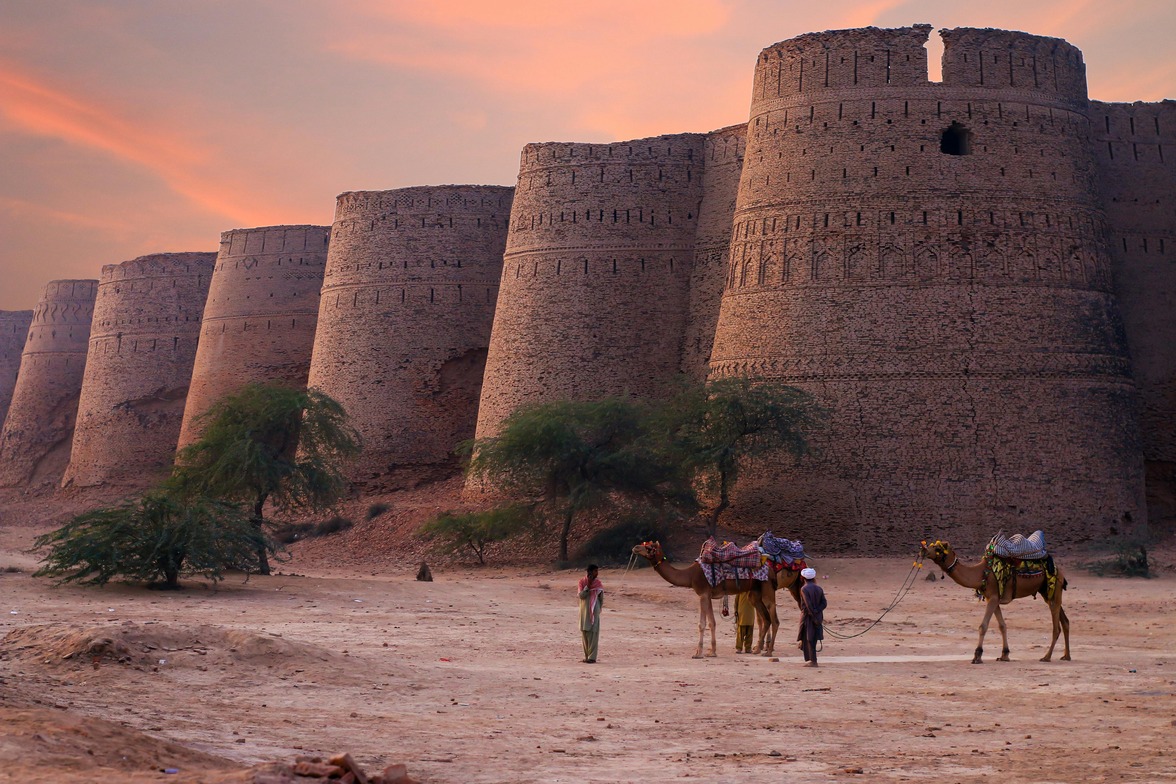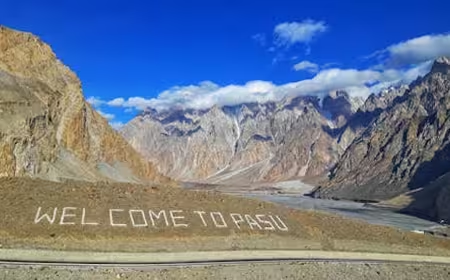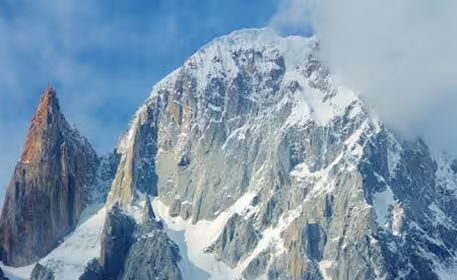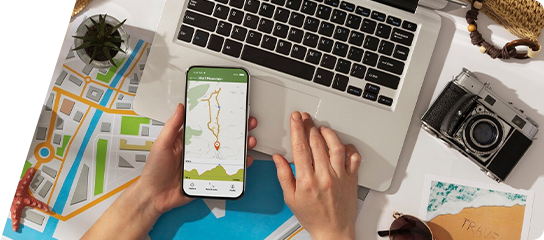
- Guide
- 30 April 2025
- Armughan Butt
Explore Pakistan: A complete guide
Pakistan is becoming a popular destination for adventurous tourists because of its rich history, various cultures and stunning scenery. From the majestic mountains in the north to the lively towns in the south - Pakistan provides a variety of experiences suitable for all types of adventurers’. The goal of this thorough guide is to give international visitors the knowledge they need to have a hassle free and unforgettable trip in Pakistan.
1. Why visit Pakistan?
A Tapestry of landscape
One of the most breathtaking natural beauty in the world may be found in Pakistan. The northern areas - encompassing Gilgit-Baltistan and KPK boast grand Mountains like K2 - verdant valleys’ like Hunza and Swat, and tranquil lakes like saif-ul-Malook. The KaraKoram highway - frequently referred to as the "Eighth wonder of the world," provides a picturesque path through this mountainous landscape.
Rich Cultural Heritage
The history of the nation stretches over millennia as seen in historic locations’, including Mohenjo-Daro and Taxila. Cities' like Lahore and Multan display Mughal architecture, featuring iconic sites; like the Badshahi mosque and Lahore fort. The kalash Valley, home to kalash people, showcases distinctive customs and celebrations
Warm hospitality
One of Pakistan's most charming traits is the kindness and hospitality of its citizens. visitors frequently share tales of residents making an extra effort to help and greet them, enhancing the uniqueness of their experience.
2. Essential Travel information
Visa and Entry requirements
Pakistan provides an electronic visa system for nationals of numerous countries. It is recommended to visit the official visa portal for the latest information and submit your application well ahead of your intended travel dates
Currency and payments
The official currency is the Pakistani rupee (PKR). Although major cities feature ATMs and accept credit cards in high end venues, cash still serves as the main method of payment, particularly in rural regions. It is advisable to bring enough cash when visiting distant areas
Language
Although English is commonly understood in metropolitan areas and tourist destinations, Urdu is the official language of the country. Gaining proficiency in a few fundamental Urdu phrases will improve your communication with locals
3. Top destinations to explore
Northern Pakistan
- Hunza Valley: Renowned for its breathtaking scenery, historical forts such as Baltit and Altit and the welcoming Hunza locals’. It provides some of the best sunset views over the Karakoram range and is a center of ecotourism.
- Skardu: An entrance to several of the planet's tallest mountains, such as K2. The area provides hiking experience and tranquil lakes such as Shangrila and Satpara. Additionally, jeep safaris', glacial walks and stargazing beneath the pristine sky are available to adventure enthusiasts'.
- Fairy Meadows: A vibrant green plateau that provides stunning views of Nanga Parbat - the ninth highest mountain in the world. Camping beneath the stars here is rewarded as one of the most enchanting experience in Pakistan.
Cultural and historical locations
- Lahore: the cultural hub of Pakistan - featuring the Lahore museum, Shalimar garden and the vibrant walled City. Be sure to visit the historic badshahi mosque and the bustling food street close to fort road to experience the vibrant flavor of Lahore.
- Multan: referred to as "the City of saints," it features many shrines’ and has a deep history that goes back to ancient eras’. Its vibrant blue ceramics and elaborately crafted tombs are essential visits for cultural enthusiasts.
- Taxila: A historical gem - revealing artifacts from the Gandhara Civilization. This UNESCO world Heritage site features historic monasteries and a museum housing invaluable Buddhist relics.


4. Travel tips for visitors
Cultural sensitivity
The society of Pakistan is conservative. Particularly, in rural areas and places of worship, modest clothing is valued. Female tourists may think about donning a scarf or shawl while exploring mosques or culturally significant areas.
Health and safety
It is recommended to consume bottled or filtered water and be careful with street food to prevent stomach issues. Make sure you are current on standard vaccinations and visit a travel clinic for any extra shots.
Transportation
Buses, trains and domestic flights are all options for traveling between cities. Companies such as Daewoo and Faisal movers provide a cozy bus travel experience. Within cities, large metropolitan areas provide ride hailing applications such as Cream and Uber.
5. Adventure and outdoor activities
Trekking and mountaineering
There are many walking trails in the Northern areas, ranging from easy walks to strenuous adventures. The fairy Meadows walk and the trip to Concordia, the K2 base camp, are popular trekking routes.
Water sports
Pakistans’ shoreline next to the Arabian Sea offers chances for scuba diving and snorkeling, especially near Charna Island close to Karachi. The region features a variety of marine species and coral ecosystems
6. Culinary delights
Pakistani food is diverse and rich with specialities found in every region.
- Karachi: Known for its seafood and biryani.
- Lahore: well-known for filling dishes including paya, nihari and other kebabs.
- Peshawar: Serves classic meals such as chapli kabab and lamb karahi.
Street food plays a crucial role in the culinary experience, featuring delights such as samosas, pakoras, and jalebis that are commonly found
7. Accommodation options
From high end hotels in large cities to quaint lodges in the mountains, Pakistan provides a variety of lodging options to fit various budgets. Homestays in areas such as Hunza offer a genuine experience and an opportunity interact intimately with local communities
8. Responsible travel
As tourism expands - it is crucial to discover Pakistan in a responsible manner to protect its natural splendor and cultural legacy. By avoiding plastic garbage, showing respect for wildlife and leaving no trace in natural regions’ - travelers’ may reduce their influence on the environment. Additionally, it is crucial to support local communities by booking accommodations at family run guesthouses, buying handcrafted goods and select tour companies that engage in sustainable tourism.
Honor regional traditions and faith based rituals. Always seek permission before photographing individuals, particularly women and refrain from entering places of worship during prayer times unless authorized. Interacting with locals in a respectful and open minded manner can foster enriching cultural exchanges and enhance the understanding of Pakistan's distinct social fabric.
9. When to visit
Summer (March to may)
This is among the finest moments to go. The climate is delightful in many areas of the nation, blossoms are at their peak and the hilly region starts to melt - presenting breathtaking views.
Summer (June to August)
The best time to visit the colder Northern areas, like Fairy Meadows, Skardu, and Hunza. However, the central and southern region can experience very hot temperatures.
Autumn (September to November)
Bright skies and fresh air create another excellent time to discover the mountains. The autumn leaves in Hunza and other northern valleys are stunning.
Winter (December to February)
The northern regions are blanketed in snow and perfect for winter activities such as skiing in Malam Jabba and Naltar. Southern cities such as Karachi and Lahore experience more temperate whether at this time
10. Internet and connectivity
The majority of Pakistan's cities have dependable internet service. you can buy a mobile sim card with 4G connectivity upon arriving at the airport or from nearby stores. Well known providers consist of jazz, zong, Telenor, and Ufone. travelers must have a passport for sim registration. However, connectivity can be spotty or nonexistent in distant areas, so make appropriate plans.
WiFi is often accessible in urban hotels and cafes, though speeds can differ. When traveling remotely, it's good idea to download offline maps and trip instructions beforehand.
11. Misconceptions and travel myths
Non-natives frequently have safety worries stemming from old News or skewed portrayals in global media. Although cautions’ and prudence are essential just like when travelling in any nation, numerous regions in Pakistan are quite safe and hospitable for visitors. Families, backpackers and lone travelers from all over the world frequently visit places like Hunza, Skardu, Lahore and Islamabad.
In reality - the Pakistani government and private sector have progressed significantly in promoting tourism and enhancing infrastructure. Road conditions in Northern regions have gotten better, and new lodging and travel services are emerging due to heightened demand.
Final thoughts
Pakistan is a place of contrasts - contemporary cities’ beside historical ruins, icy peaks adjacent to Golden deserts and variety cultures coexisting peacefully. Every tourist can find something to enjoy here whether it's history, adventure, friendliness, or just the excitement of seeing new places.
For international visitors looking for an unconventional destination that is abundant in rewards, Pakistan guarantees memorable experiences and tales worth sharing. By having thoughtful preparation, a courteous demeanor, and a receptive spirit, your travels in Pakistan can become one of the most uplifting experiences of your lifetime.
Are you prepared to travel to Pakistan? bring along your curiosity, spirit of adventure, and camera because you are about to explore one of the most stunning and underappreciated tourism places on earth.

